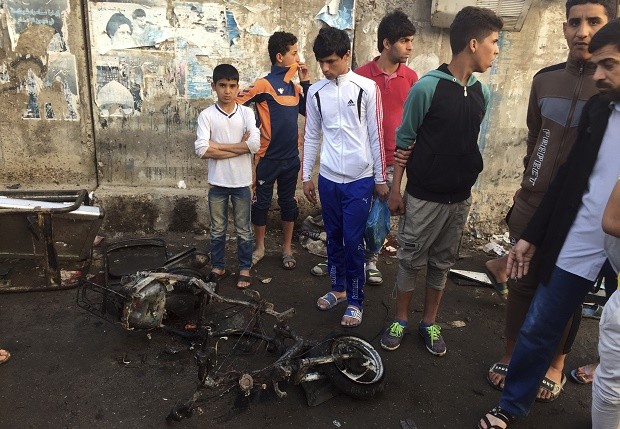
People gather at the scene of bombing attacks in Sadr City, Baghdad, Iraq, Sunday, Feb. 28, 2016. Militants attacked Mredi outdoor market on Sunday in eastern Baghdad, killing at least 24 people and wounding dozens, officials said. Minutes later, a suicide bomber blew himself up amid the crowd that had gathered at the site of the first bombing, he added. AP
BAGHDAD, Iraq — Bombings claimed by the Islamic State of Iraq and Syria (ISIS) group killed at least 33 people in a Shiite area of Baghdad Sunday, officials said, the deadliest attacks in the Iraqi capital this year.
ISIS also attacked an army position in an area west of Baghdad, seizing it and killing at least eight security personnel over the course of the day.
READ: Report: Most ISIS bombs made with civilian components | ISIS bombs kill more than 140 as US, Russia press Syria truce
The two blasts near a market in the Sadr City area of northern Baghdad, at least one of which was a suicide bombing, also wounded at least 79 people, security and medical officials said.
ISIS, which overran swathes of territory north and west of Baghdad in 2014, claimed the attacks in a statement online that said two suicide bombers had detonated explosive belts in Sadr City.
ISIS considers Shiite Muslims, who make up the majority of Iraq’s population, to be heretics and frequently targets them with bombings and other attacks.
Suicide bombings are a tactic almost exclusively used in Iraq by ISIS.
The jihadist group claimed twin suicide bombings targeting Shiite worshippers on Thursday that killed at least nine people in Shuala, another Shiite-majority area in northern Baghdad.
ISIS also launched an attack on an army position in the Abu Ghraib area west of the city on Sunday, security officials said.
The jihadists attacked the position early in the morning and held it until government reinforcements arrived and took it back later in the day, the officials said.
The Abu Ghraib violence killed at least eight people, including both members of the security forces and allied paramilitaries, and wounded at least 22, while ISIS members were also killed, officials said.
While attacks are still common in Baghdad, violence in the city has decreased significantly since ISIS launched a sweeping offensive in June 2014, after which many of its militants became occupied with fighting elsewhere.
In early 2015, the Iraqi government ended a long-running curfew that kept most Iraqis off the streets between midnight and 5:00 am (1800 to 0200 GMT), a move that expanded freedom of movement and has not negatively impacted security.
The Iraqi government is now building a series of walls and trenches at various points surrounding the capital with the aim of restricting the movement of militants and curbing other illegal activity.
Security spokesman Brigadier General Saad Maan has said that after the completion of the first phase of construction, half of the checkpoints in the capital will be removed, though such proposals have been made before but not implemented.
The city is littered with checkpoints manned by forces who often wave cars through or at most perform cursory searches, adding little to security while causing major traffic jams.
Security personnel at many Baghdad checkpoints, including those leading to the heavily-fortified Green Zone, still employ “bomb detectors” that have long since been proven to be fake.